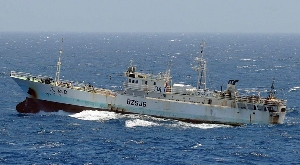Somalia has banned fishing trawlers from fetching fish in its territorial seas, part of a new effort to stop overexploitation of the fish in the Indian Ocean.
The Ministry of Fisheries and Blue Economy in a circular dated April 6 said vessels will no longer be permitted to pull trawlers, a deep-sea indiscriminate fishing instrument that some critics say nets even the unwanted species and hence deplete the maritime wildlife.
“The Ministry notifies all fishing companies and vessels in Somali waters a crucial regulation outlined in the Somali Federal Fishery law, specifically in article 31… trawling activities within the Somali Federal territorial waters are strictly prohibited,” the circular says.
“Any violations of this regulation may result in fines, imprisonment, confiscation of fish products acquired, and confiscation of equipment for trawling.”
The notification comes after Somalia, in March, released 33 Iranian fishermen and sailors imprisoned in the country for practicing Illegal, Unreported, And Unregulated (IUU) fishing within Somali waters.
Last year, Somalia’s Office of the Attorney General charged 36 foreign nationals for illegal fishing activities, indicating a tougher approach to the protection of Somalia’s marine resources.
With the longest coastline in mainland Africa, Somalia’s fishes have often been fetched illegally, owing to collapsed institutions after the civil war in 1991, and the fact that Somalia lacked critical laws to try suspects.
Omar Abdulle Hayle, a fishery expert in Mogadishu, told Nation that IUU is very rampant in Somalia waters, a coastline that extends over 3000 km.
So far, the foreign fishing fleets reportedly involved in IUU include Iranians, Pakistanis, Thais, Yemenis, Chinese, and Spaniards that are blamed for acting harmfully to the water resources including the use of merciless fishing methods, according to a dispatch from the Somali government.
Hayle said, “Use of trawl fishing is destructive in nature, especially the bottom trawling that causes damage to coral reefs and other marine environs,” he added unless it is designed or used for mid-water or surface-water fishing.
Somalia has lately been worried about overfishing and damage to the marine environment after studies indicated some richer countries were also dumping waste in the nearby ocean.
Abdi Ali-Yare, a fishery technologist in Mogadishu, told Nation that Somalia’s fishery portfolio employs MCS, that is Monitoring, Control, and Surveillance.
“MCS is a section that operates inside the Ministry of Fisheries and is used to control via satellite, the position of the fishing vessels licensed by the Somali government,” said Ali-Yare
“The system can readily spot also unlicensed fishing vessels, but Somalia can do little about their suspected crimes against its marine resources,” he added.
Both Hayle and Ali-Yare agree that Somalia has a nascent coast guard force, limiting its ability to confront IUU, including that just banned trawl fishing.
On top of that, many vessels are known to possess licenses from regional authorities.
“The breakaway Somaliland administration and the semiautonomous authority of Puntland (one of Somalia’s federal member states) are known to issue licenses independently from the central government,” said Hayle.
Somaliland and Puntland are in the northern regions of Somalia, and they command about half of Somalia’s marine waters.
“Jubbaland, another federal member state of Somalia, is suspected to be licensing vessels to a lesser extent,” he added, referring to Somalia’s most southern state, neighbouring Kenya.
The experts also agree that piracy is the only thing that can effectively deter IUU.
“Unfortunately, the youth that initially organized themselves to confront the foreign vessels venturing into the Somali waters, expanded their operation from the coastal communities’ defense initiative to infamous piracy,” Hayle added.
“Ransom payments suddenly became the yeast adding flavour to the profitability of the piracy,” he added.
Somalis are to a certain extent disturbed that international naval forces against piracy have little appetite to tackle practising illegal fishing vessels.
Operation Ocean Shield was NATO's contribution to Operation Enduring Freedom - Horn of Africa (OEF-HOA), an anti-piracy initiative in the Indian Ocean; European Union Naval Force Somalia Operation Atalanta; and other occasional forces like the Indian navy operating against piracy but inactive against such international crimes as IUU.
By the same measures, Somalis are cagey about the effectiveness of orders to ban fishing trawlers from the country’s oceanic waters, employing only papers.
Africa News of Thursday, 11 April 2024
Source: theeastafrican.co.ke













